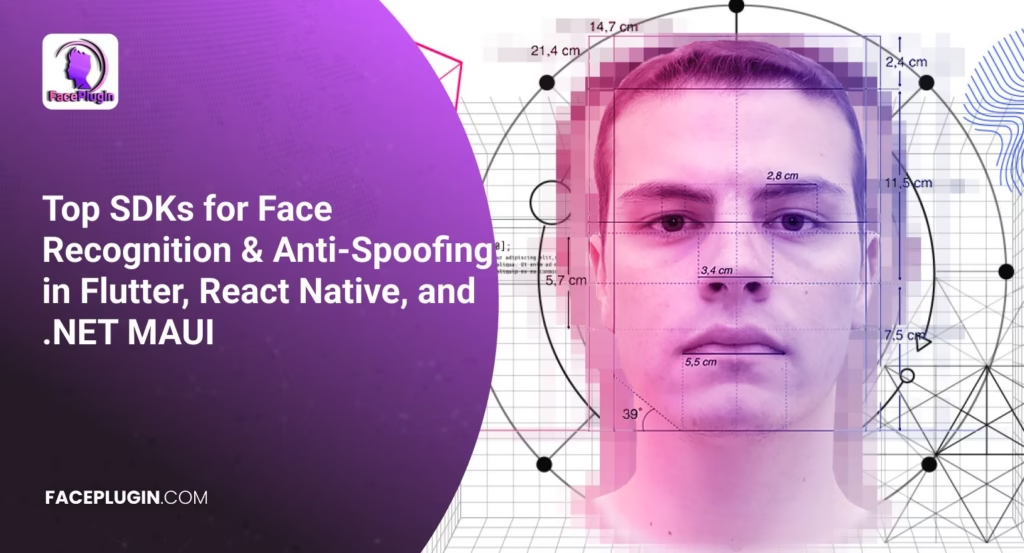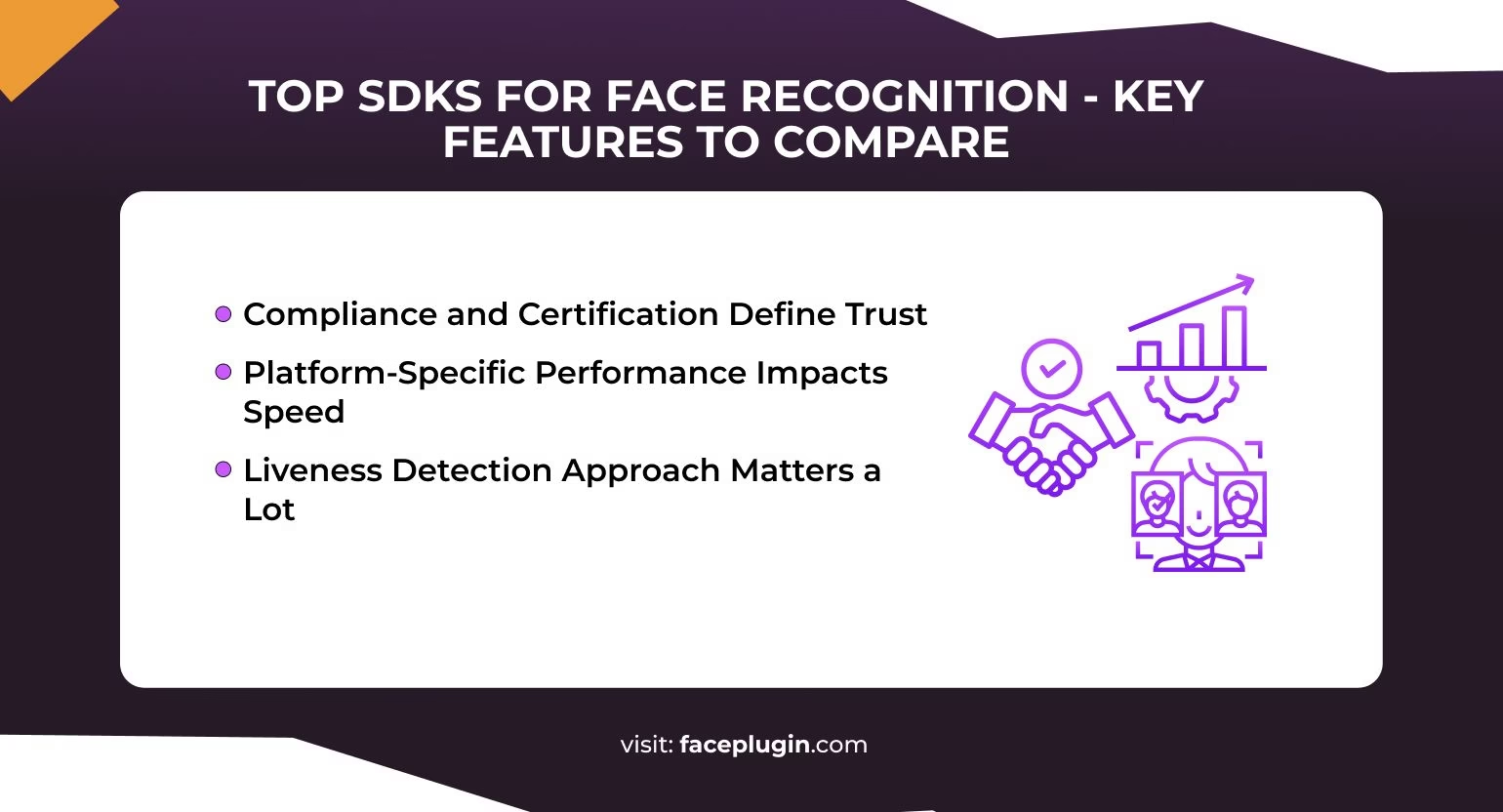Top SDKs for Face Recognition and Anti-Spoofing in Flutter, React Native, and .NET MAUI are redefining the future of secure identity verification across digital platforms.
In a world increasingly driven by AI and automation, biometric authentication, especially facial recognition, has emerged as the gold standard for high-assurance identity checks. From fintech onboarding to healthcare access control, industries are rapidly shifting toward face-based login methods that are fast, intuitive, and virtually frictionless.
However, as facial recognition adoption surges, so do threats like deepfake spoofing, replay attacks, and face morphing. This is where anti-spoofing technologies, particularly 3D passive liveness detection, play a mission-critical role.
Developers now face a new challenge: finding an SDK that not only provides accurate recognition but also offers foolproof protection against biometric fraud.
This article explores the top SDKs for face recognition and anti-spoofing that support modern cross-platform development environments, including Flutter, React Native, and .NET MAUI.
We’ll break down each SDK’s strengths in performance, security, integration, and compliance, helping you select the right tool for building enterprise-grade biometric solutions in 2025 and beyond.
Whether you’re designing a fintech app, a health platform, or secure enterprise access, this is your go-to guide to picking the most robust face authentication SDK.
Top SDKs for Face Recognition and the Need for Secure Mobile Biometrics in 2025 and Beyond
With fraud going smart, Top SDKs for Face Recognition aren’t a choice, they’re now mandatory. The digital identity threat landscape has exploded in 2025. Deepfakes, face morphing, and replay videos, they’ve all gone weapon-grade. Face-based logins alone don’t cut it anymore.
Why?
Because attack vectors evolve fast. We’re seeing AI-spoofing attacks bypass legacy systems daily. That’s why passive 3D liveness detection is now the security baseline, not a premium.
Add to that the new compliance demands:
- ISO/IEC 30107-3? Required.
- NIST PAD levels 1 & 2? Standard now.
- GDPR & CCPA? You bet.
Top SDKs for Face Recognition beat OTPs and passwords any day. Here’s why SDK-based biometrics win:
- Zero friction onboarding with seamless UX
- Multi-modal spoof detection, not just surface checks
- No user effort, just blink-and-go security
- One-time face = long-term trust
But that’s not all. Enterprises want privacy-first face verification SDKs. Tools that work offline, too.
Top SDKs for Face Recognition now must support:
- Edge-device processing with no server leaks
- Data minimization & biometric encryption
- On-premise deployment for critical sectors
Honestly? In 2025, face SDKs will be either proactive or obsolete. Choose smart, or get spoofed.
Top SDKs for Face Recognition and Anti-Spoofing in Flutter, React Native, and .NET MAUI
Selecting the top SDKs for face recognition isn’t just about feature lists; it’s about real-time threat defense, platform flexibility, and regulatory trust.
Today, developers need biometric SDKs that offer high-accuracy face matching and advanced spoof resistance without slowing down performance or compromising data privacy. Below, we cover industry-proven SDKs optimized for Flutter, React Native, and .NET MAUI apps.
FacePlugin – Advanced Cross-Platform Biometric SDK
FacePlugin stands out as one of the top SDKs for face recognition. It supports Flutter, React Native, and .NET MAUI natively.
Core capabilities
- Real-time facial recognition with deep feature vectors
- Non-intrusive 3D passive liveness detection
- Full offline support for privacy-first apps
- Certified with ISO 30107-3, GDPR compliance
- Built-in on-premise and cloud deployment modes
- Evaluated by NIST with demographically fair AI
Ideal for industries like
- Fintech: biometric KYC, secure transactions
- Healthcare: patient verification, access control
- KYC/AML platforms: anti-fraud onboarding
- Access control systems: multi-platform security
Among the top SDKs for face recognition and anti-spoofing in Flutter, React Native, and .NET MAUI, FacePlugin delivers unmatched speed, accuracy, and data control.
Unique highlights
- Supports hybrid edge-cloud architecture
- Offers face match confidence scoring
- Ultra-fast SDK load time and low memory footprint
KBY-AI Face SDK – Feature-Rich SDK for Flutter & React Native
KBY-AI delivers one of the top SDKs for face recognition in Flutter. Its Dart integration is smooth and built for performance.
Core strengths include
- TensorFlow Lite support with C++ backend
- High-speed face detection and anti-spoofing
- Extra features: emotion, age, and gender estimation
- Optimized for e-learning, social platforms, and B2C apps
Limitations
- Lacks enterprise-level certifications
- No support for .NET MAUI at present
- Not ideal for heavily regulated sectors
Use this SDK if your product is frontend-heavy, lightweight, and doesn’t require NIST-grade security.
Banuba Face AR SDK – Augmented Reality + Face Tracking
Banuba isn’t strictly a security-first SDK, but it shines in real-time facial augmentation.
Strengths include
- Powerful face tracking for AR animations
- Integrates with Flutter and React Native
- Offers lightweight face recognition support
Ideal for
- Gaming, social media, creative filters, interactive video
Limitations
- Weak on spoof protection
- Not suitable for compliance-bound use cases
- Security is secondary, aesthetics first
Use Banuba only where user interaction matters more than security.
FacePlugin’s .NET MAUI SDK – Enterprise-Grade Multi-Platform Biometrics
Among the top SDKs for face recognition on .NET MAUI, FacePlugin delivers true enterprise-grade performance.
Cross-platform support
- Windows, Android, iOS, macOS
- Seamless .NET C# integration
- Low-latency performance with biometric encryption
Bonus support
- Comes with a dedicated WPF variant for secure desktop use
- Works perfectly in kiosk, ATM, or high-assurance terminal setups
Its offline liveness detection makes it ideal for banks, airports, and government portals using the Microsoft tech ecosystem.
These top SDKs for face recognition each serve distinct audiences. But only FacePlugin checks all boxes: privacy, compliance, speed, and real-time AI.
Top SDKs for Face Recognition – Key Features to Compare
When choosing from the top SDKs for face recognition, you can’t just go with popularity. You need to compare under the hood. Tech teams must evaluate SDKs based on how they handle liveness, integrate cross-platform, and meet compliance. Let’s break it all down for you below.
Liveness Detection Approach Matters a Lot
Liveness detection is your anti-spoofing defense. All top SDKs for face recognition offer one of three types:
- Passive Detection (like FacePlugin): No user interaction needed. Works silently in the background.
- Active Detection: Asks users to blink, smile, or turn their heads.
- Hybrid: Combines both passive and active checks.
Why passive 3D wins
- It’s more frictionless.
- Harder for attackers to trick it.
- Better UX. No extra steps for users.
Real 3D passive systems analyze depth, texture, and reflectivity. They can spot paper masks and deepfakes within milliseconds.
Platform-Specific Performance Impacts Speed
Each SDK behaves differently based on its framework:
- Flutter: Dart Isolates offload biometric work from the main thread.
- React Native: Native modules beat JS Bridge in face recognition speed.
- .NET MAUI: C# interop gives low-latency access to system-level biometric services.
FacePlugin optimizes for all three. Some SDKs don’t. That’ll cause bottlenecks and UX lag.
Compliance and Certification Define Trust
Regulations matter, especially for apps in finance, health, or government:
- ISO/IEC 30107-3 (Presentation Attack Detection)
- iBeta/NIST evaluations prove real-world spoof resistance
- GDPR, HIPAA, SOC2 for privacy and security
Top SDKs for face recognition meet these benchmarks. If one doesn’t, don’t ship it. Not worth the legal risk.
Top SDKs for Face Recognition – Real-World Performance and Integration Insights
Not all biometric tools perform the same. When comparing the top SDKs for face recognition, you must test them in real-world environments. The fastest SDK on paper can lag in production. This section breaks down the real-time performance and framework-level integration of the leading options.
Real-World Performance Benchmarks of Top SDKs for Face Recognition
Latency and liveness accuracy shape the usability of any facial SDK. Here’s how the top SDKs for face recognition perform under real-world test loads:
FacePlugin
- Latency: Under 100ms. Near-instant.
- Offline Support: Fully available.
- 3D Liveness: Passive, highly secure.
- Certifications: NIST, GDPR, ISO, SOC2.
KBY-AI
- Latency: 120–150ms.
- Offline Support: Available.
- 3D Liveness: Not supported (2D detection only).
- Certifications: Lacks enterprise compliance tags.
Banuba
- Latency: Around 80ms.
- Offline Support: Yes.
- 3D Liveness: No (AR filters, not biometric-secure).
- Certifications: No NIST or GDPR validation.
Azure Vision
- Latency: 300–500ms on cloud.
- Offline Support: None.
- 3D Liveness: Cloud-based only.
- Certifications: Certified, but privacy tied to cloud.
Rekognition
- Latency: Around 400ms.
- Offline Support: Not available.
- 3D Liveness: Cloud-hosted only.
- Certifications: Yes, but not on-device.
SDK Integration Overview by Framework
You don’t just need performance. You need fast, clean integration. The top SDKs for face recognition should work with your stack smoothly.
Flutter Integration
- FacePlugin uses Dart plugin architecture for speed.
- Native TensorFlow Lite pipelines ensure fast inference.
- KBY-AI offers easy quickstart modules.
React Native Integration
- JS Bridge often slows down biometric ops.
- FacePlugin overcomes this with native bridge binding.
- Banuba’s ARFace plugin offers basic face tracking.
.NET MAUI Integration
- FacePlugin’s native C# SDK is production-tested.
- Xamarin bindings help hardware access on Android/iOS.
- WPF variant supports Windows biometrics and terminals.
Ideal Use Cases for Top SDKs for Face Recognition
Choose SDKs based on the core use case. Each one fits a niche:
- Banking, KYC, Fintech: FacePlugin with passive liveness and NIST-grade security.
- EdTech, Emotion Analytics: KBY-AI with age, gender, and emotion classifiers.
- Social, Games, AR: Banuba for face masks and real-time tracking.
- Enterprise Access Control: FacePlugin (WPF/MAUI) for offline desktop environments.
Top SDKs for Face Recognition – Final Verdict for 2025+ Integration
When selecting from the top SDKs for face recognition, context matters more than features alone. Every SDK has its sweet spot performance, platform fit, or compliance. So, choose based on your use case, not just popularity.
If you’re building for finance, insurance, or health tech, FacePlugin dominates. It leads with sub-100ms latency, 3D passive liveness, and full offline support. Its native integration across Flutter, React Native, and .NET MAUI gives it a serious edge.
Unlike cloud-only tools, it works in low-bandwidth or air-gapped setups. That’s a win for privacy-first environments.
For education apps or emotion analytics, KBY-AI might fit better. It brings high-speed facial recognition with good offline capabilities. But remember it lacks passive liveness, which limits fraud resistance.
Banuba suits AR-heavy use cases like social media and games. But it’s not made for secure verification. Azure and Rekognition offer high-end cloud APIs, but latency and lack of offline support make them unfit for mobile-first onboarding.
Future-proof SDKs must be fast, secure, and multi-platform. Only a few deliver that trifecta. FacePlugin nails all three making it the standout in this stack. If you’re scaling biometric systems in 2025, pick one of the top SDKs for face recognition that won’t limit your roadmap.
Elevate Your Identity Security: Advanced Biometric Solutions at FacePlugin
Transform the way you secure and verify identities with FacePlugin, the leading provider of cutting-edge biometric authentication and ID verification solutions. Our platform is designed to meet the highest standards of security and efficiency, offering seamless integration for businesses across various industries.
At FacePlugin, we understand the importance of protecting your digital assets. That’s why we provide robust solutions, including advanced face recognition, face liveness detection (anti-spoofing), and ID document recognition technologies. Our solutions are engineered to ensure that identity verification is not only secure but also user-friendly and accessible.
Explore our range of customizable solutions, available both online and through our mobile SDKs. Whether you require on-premises or cloud-based deployment, FacePlugin has you covered with flexible options tailored to your specific needs. If you want to learn more about us, you can explore our articles on our website.
Experience the future of identity security today with FacePlugin—where innovation meets reliability. Start your journey towards enhanced security and peace of mind by visiting our website or trying our solutions online.
📍 FacePlugin – Contact & Integration Support
Head Office Address
📍 701 N. Fort Lauderdale Beach Blvd, Fort Lauderdale, FL 33304
📞 Phone: +1 (442) 229-5661
📧 Email: info@faceplugin.com
📱 Telegram: https://t.me/faceplugin
Get quotes and technical support from the expert team for smooth onboarding.





